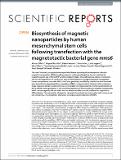Biosynthesis of magnetic nanoparticles by human mesenchymal stem cells following transfection with the magnetotactic bacterial gene mms6
Abstract
The use of stem cells to support tissue repair is facilitated by loading of the therapeutic cells with magnetic nanoparticles (MNPs) enabling magnetic tracking and targeting. Current methods for magnetizing cells use artificial MNPs and have disadvantages of variable uptake, cellular cytotoxicity and loss of nanoparticles on cell division. Here we demonstrate a transgenic approach to magnetize human mesenchymal stem cells (MSCs). MSCs are genetically modified by transfection with the mms6 gene derived from Magnetospirillum magneticum AMB-1, a magnetotactic bacterium that synthesises single-magnetic domain crystals which are incorporated into magnetosomes. Following transfection of MSCs with the mms6 gene there is bioassimilated synthesis of intracytoplasmic magnetic nanoparticles which can be imaged by MR and which have no deleterious effects on cell proliferation, migration or differentiation. The assimilation of magnetic nanoparticle synthesis into mammalian cells creates a real and compelling, cytocompatible, alternative to exogenous administration of MNPs.
Citation
Elfick , A , Rischitor , G , Mouras , R , Azfer , A , Lungaro , L , Uhlarz , M , Herrmannsdörfer , T , Lucocq , J M , Gamal , W , Bagnaninchi , P , Semple , S & Salter , D M 2017 , ' Biosynthesis of magnetic nanoparticles by human mesenchymal stem cells following transfection with the magnetotactic bacterial gene mms6 ' , Scientific Reports , vol. 7 , 39755 . https://doi.org/10.1038/srep39755
Publication
Scientific Reports
Status
Peer reviewed
ISSN
2045-2322Type
Journal article
Description
This work was funded under the FP7 EU project “MAGISTER”. Grant Number: NMP3-LA-2008-214685 and additionally supported through a MRC Confidence in Concept scheme award to the University of Edinburgh.Collections
Items in the St Andrews Research Repository are protected by copyright, with all rights reserved, unless otherwise indicated.

